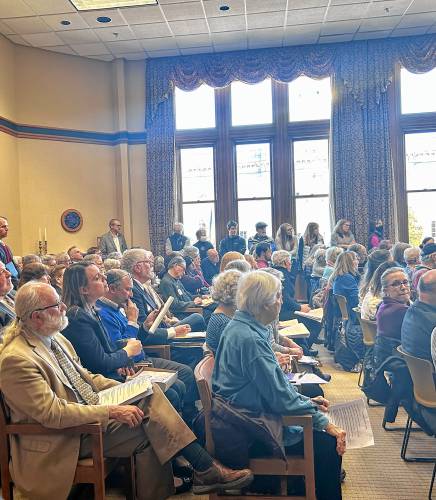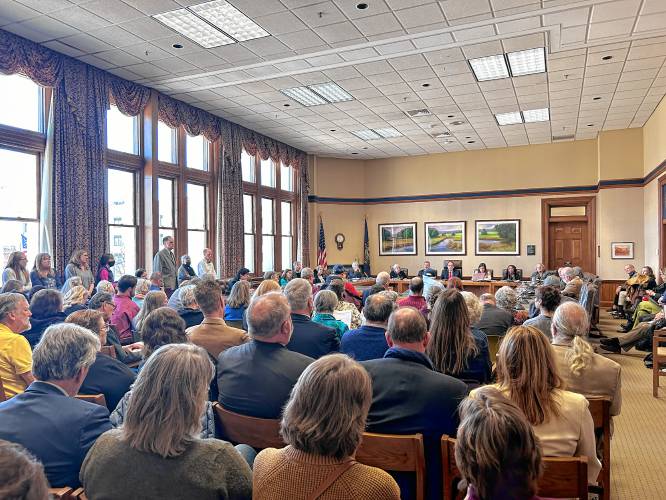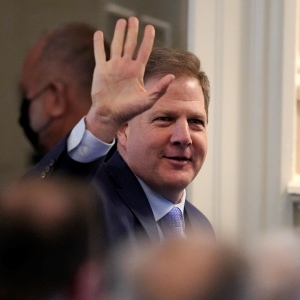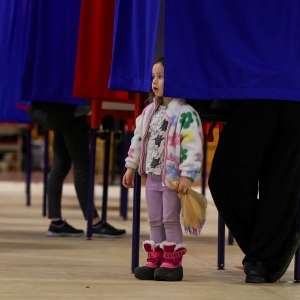Medical assistance in dying bill draws large turnout
| Published: 02-07-2024 5:09 PM |
People in wheelchairs, others relying on crutches, some facing terminal illness and some caregivers packed a hearing Wednesday for a bill that would allow medically assisted dying in New Hampshire.
While most of the attendees expressed support for House Bill 1283 to help those enduring pain during the final stages of life, Jonathan Eddinger, president of the state board of medicine, advocates for a shift in focus toward improving the ability to alleviate pain and suffering rather than making death an option to end such agony.
“In terms of palliative care, we get very little training in medical school in terms of how to palliate, how to deal with dying,” said Eddinger. “99% of my training is how to cure disease, how to help people, how to get them better. We have very little at the end of life.”
He wants to see the state invest more funds and effort in training physicians in palliative care rather than relying on a pill to end life.
Modeled after laws in 10 other states and Washington, D.C., including neighboring Maine and Vermont, New Hampshire’s bill would allow individuals over 18 years of age with terminal illnesses to choose self-administered means to end their lives.
Individuals must have two healthcare practitioners verify their eligibility for these medications. The first prescribing provider would verify that the person meets the criteria under the End of Life Options Act. This includes ensuring the individual is mentally sound, has a prognosis to live six months or less, has voluntarily made the decision and is informed about alternatives, among other factors. The second healthcare provider must then confirm those qualifications.
People both for and against the bill took the microphone to voice their opinions to lawmakers for three hours before the House Judiciary Committee decided to take a recess.
Despite opposition labeling it as a pathway to suicides, advocates and medical professionals rallied in support, crossing state lines to lend their voices to the cause.
Article continues after...
Yesterday's Most Read Articles
One such advocate, Diana Barnard, a physician specializing in Hospice and Palliative medicine from Vermont, stood firmly behind the bill.
She emphasized the need for medical professionals to have a toolkit to alleviate suffering, which includes medically assisted dying.
“This is about patients. This is not so much about physicians, it’s not even so much about lawmakers. It’s about patients who are suffering and who fear suffering and who want to have the option of a measure of freedom and control when they are facing their own death,” Barnard said.
Vermont has had medically assisted dying in place for 10 years and Barnard said that data indicates its responsible implementation, dispelling concerns of abuse.
The language in the New Hampshire bill is such that even if a patient is terminally ill and fulfills all the criteria, the eligibility for this option hinges on the ability to self-administer the medication – a provision shared with other states.
However, one of the main concerns with the bill is whether it is suicide or grants individuals autonomy over their bodies.
At the hearing, different perspectives were brought to the table.
“Suicide is a one-person thing. Suicide, if assisted, is murder,” said Armand Soucy, the chaplain for the state veterans advisory committee, stressing that the lines are blurred with the end-of-life option.
Suicide and medical aid in dying are significantly different, others agreed.
“People who choose suicide die alone, and suicide tends to be a violent death,” said Ken Norton, former executive director of NAMI-NH.
A common question for medical professionals was whether this law would breach the ethical values that guide them.
For Gary York, a physician from Hopkinton, the bill represents a compassion-driven initiative.
Rep. Charlotte DiLorenzo of New Market asked about the compatibility of medically assisted dying with the Hippocratic Oath.
York replied: “Do no harm. If you allow people to suffer, you are doing harm.”









 ‘A wild accusation’: House votes to nix Child Advocate after Rep. suggests legislative interference
‘A wild accusation’: House votes to nix Child Advocate after Rep. suggests legislative interference  Sununu decides he won’t run for Senate despite praise from Trump
Sununu decides he won’t run for Senate despite praise from Trump Town elections offer preview of citizenship voting rules being considered nationwide
Town elections offer preview of citizenship voting rules being considered nationwide Medical aid in dying, education funding, transgender issues: What to look for in the State House this week
Medical aid in dying, education funding, transgender issues: What to look for in the State House this week
